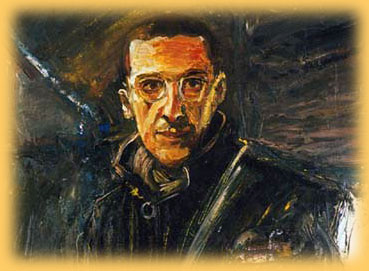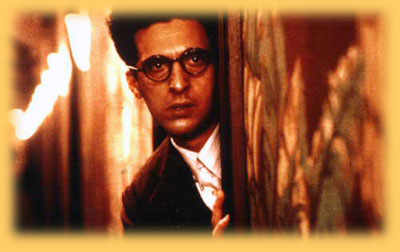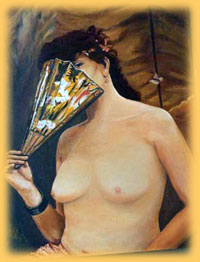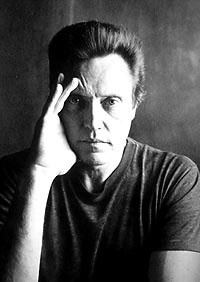DO ME AND THY STAGE
SHALT ILLUMINATE
Rana Bose
[Rana Bose has written and directed 10 plays. His most recent play, Black
Skirt, was performed in 1998]. Ed.
* * * * * * * *
I have been sparring with my inner demons to write or not
to write this review.
I decided to see Illuminata because John Turturro projects
that fiendish intelligence that propels one towards cinema of a certain 'non-mainstream'
variety. (I emphasize 'non-mainstream' because today there are so many layers
of undergroundism and repertoriness that the word 'cinema parallele' has lost
its significance -- now that it is housed and sponsored by that chrome and glass
neuro-tech temple called Ex-centris in Montreal.) The Main has changed and so
has this world. And in that changing world, Turturro revives some interest in
the complexity of theater emotions as a challenge to the facile and cosmetic
common sens-isms of the 'globalized' world that today is being retailed everywhere
in an arguably nonsensical manner.
 Turturro's
Fink-ish demeanor conveys mischief not unlike Kevin Spacey, another favorite
of mine of the recent surprise hit American Beauty. Each, in his own way, is
able to sustain mischievous suspense with a suspect smile, and although poles
apart in their respective styles, they succeed in breathing life into their
cinematic efforts through what they leave unstated or implicit. Pulp enfantilism
is passé, and must collapse into its inanity. Turturro provides the mature
alternative to Tarrantino with his intelligent classicism.
Turturro's
Fink-ish demeanor conveys mischief not unlike Kevin Spacey, another favorite
of mine of the recent surprise hit American Beauty. Each, in his own way, is
able to sustain mischievous suspense with a suspect smile, and although poles
apart in their respective styles, they succeed in breathing life into their
cinematic efforts through what they leave unstated or implicit. Pulp enfantilism
is passé, and must collapse into its inanity. Turturro provides the mature
alternative to Tarrantino with his intelligent classicism.
As a theatre person, I am amused by the notion that theater
can be lensed. And yet it has; by Turturro, himself, along with the artful performances
of other theater aficionados like Susan Sarandon and Ben Gazzara. Perhaps, unknown
to me, the entire crew of Illuminata has a strong theater background.
What is it all about? Lies in life and in theater, imperfect
love between the scenes and between lives, about a desperate diva in her twilight
years, about the many facets of fornication, hysteria and ribaldry, about the
slanderous nature of theater critics who allow their sexuality to molest the
art of criticism. And finally, it's about a world (our world) where acted and
real emotions blend in and out, go back and forth using the slender curtain
as the dividing line.
 Such
is Illuminata. Stark honesty and dark deceit converge on a theater stage, but
under the sure lens of John Turturro's masterfully directed movie of theater
life in New York in the early part of this century, it throws into stark relief
the intricacies and travails of staging a play when up against formidable emotional,
egotistical and commercial barriers. The playwright succeeds, as a fencer would,
because he has been relentlessly vigilant with near mechanical brilliance.
Such
is Illuminata. Stark honesty and dark deceit converge on a theater stage, but
under the sure lens of John Turturro's masterfully directed movie of theater
life in New York in the early part of this century, it throws into stark relief
the intricacies and travails of staging a play when up against formidable emotional,
egotistical and commercial barriers. The playwright succeeds, as a fencer would,
because he has been relentlessly vigilant with near mechanical brilliance.
Here are some of the (p)layers.
TUCCIO: [the young playwright, played by Turturro
himself].
"The day we met, everything I said was true. I started lying on the second
day at dawn." Riding a black horse, with white shirt sleeves billowing
in the wind, Turturro ends the movie by galloping through a glen towards the
camera, with his quasi French-cut beard barely concealing his mischievous melting
smile that continuously makes his chin tilt to his right. His play is staged.
The multi-layered conspiracy works. That is why he smiles.
CELIMENE: [ the diva, played by the wistfully
sexy Susan Sarandon].
"When I am telling my mother, I love her, I am lying . . . Acting is lying.
I love acting so much, that I could die for it. Theater is worth dying for .
. . " Celimene will play the lead in his new play, Illuminata, but only
if Tuccio sleeps with her. As she lifts her dress up, with her back to the audience,
she looks down and says: "And all this can be yours . . . " Prior
to that, she waits for him in her boudoir, in a nightgown that barely conceals
her sagging breasts. When he expresses disinterest, she firmly places her hand
on his crotch and attempts to masturbate him, while talking business. When he
explodes in anger (while pleasure seeps up his loins) with the sudden realization
that he is verging on intellectual compromise and betrayal of his true love,
she agrees to work for him, because she also realizes that as a diva her days
are digital, running on low battery power. As a last resort, she says vaingloriously,
"Look how many ugly people there are in the world. No wonder they pay us
so much money."
RACHEL: [the prima donna].
"You're the worst kind of liar, because your lies always have the ring
of truth." Played by Katherine Borowitz, Rachel drifts in and out of her
lines on stage and in the wings. During her tender moments with Tuccio, lines
from their parts unavoidably creep in, blurring the distinction between real
life and acting. The theater scrim (the slender curtain), as metaphor, pre-figures
the two time realms the characters move in and out and off and on stage and/or
the world stage.
DOMINIQUE: [the leading man, played by Rufus
Sewell ].
"I once fashioned you a dog yelping at my heels and so I stopped to kick
you; now, like dust, you settle and are ignored." Cocky, arrogant, self-assured,
ambitious but unattractive? Yes. But, played out with consummate accuracy by
Sewell, a character type with which I am very familiar because the theater industry
is replete with them: careerist and driven, but intellectually incapable of
rising to the occasion; busy and obsessed with being in demand but unconcentrated
on the project at hand. Paris gleams in his eyes as the ultimate mecca of theater.
SIMONE: [the ingenue, played by Georgina Cates].
"Sometimes when you write . . . I press my forehead against your door as
hard as I can to give you inspiration."
 TUCCIO:
"You should press harder."
TUCCIO:
"You should press harder."
Simone is ordinary. Her acting (in theater) is pedestrian. So it follows that
her life is equally so. How can you shine, if you cannot lie/act? So her lover,
another ordinary actor/ordinary life dies unceremoniously of a repeated fainting
illness. Predictable, again. Fainting is a sign of overall weakness. No?
BEEPO: [ the clown, a stellar performance
by the indomitable Ben Gazzara.]
"A clown laughs at death". Yes, always the master stroke. There is
nothing to live for, but to live for the success of the company, if you are
but a clown. The lives of the ordinary are peripheral, but must be lived with
riotous abandon. And that is exactly what Gazzara attains in his role as Beepo.
BEVALACQUA: [The theater critic played by
Christopher Walken].
Now here is someone played masterfully by the sordidly dressed Walken. In a
hairpiece caricaturizing Oscar the Wilde, Bevalacqua sits in his little box
up in the opera house, while being fed nuts by his concubines (who also double
as his stenos, while the show is going on) carefully eyeing every male body
for future possibilities. Criticism be damned. It's bodies that he is after
and if his perception is clouded by his sexual proclivities, so be it for the
city's theater audience. They have to grin and bear it because he is the city's
only theater critic! And he is, after all, not particularly enamoured by heterosexual
love. So at the après-play, he extols the 'acting' abilities of the one
whom he has identified as the one with "possibilities. An absolutely inane
role player with a face of a pantomime character.
 So
there you have it. All thespian intrigues and conspiracies must converge on
stage in multi-layered fornication. Divas must be gratified. Sponsors must have
their tear-jerky, artless eyes smothered by the bovine breasts of the actress
(carefully co-conspired and executed); the clown must get his fill of food and
sex, and the homosexual critic must be allowed a half-assed attempt at a lay!
And thus the play gets staged.
So
there you have it. All thespian intrigues and conspiracies must converge on
stage in multi-layered fornication. Divas must be gratified. Sponsors must have
their tear-jerky, artless eyes smothered by the bovine breasts of the actress
(carefully co-conspired and executed); the clown must get his fill of food and
sex, and the homosexual critic must be allowed a half-assed attempt at a lay!
And thus the play gets staged.
TUCCIO says: "Our lives wind themselves
out. When they wind together that is something fine and rare . When they unravel,
I leave it to others to diagnose the cause."
So, as I started out by explaining that my conflict in reviewing
this play/movie revolves around the shared pain of trying to develop roles in
the theater world and bringing it all together in a successful production, while
at the same time being all too cognizant of the fact that we, in theater, are
all at the mercy of the film critic whose judgment may be impaired by his 'subjectivities.'
And now I find myself in that same role, (rest assured that all 'personal preferences'
are in-command), and declare that Turturro wins the day with his superb Illuminata
by very simply smiling at the lens in his inimitable fashion. Rating: * * *
Cast includes:
John Turturro .................Tuccio
Katherine Borowitz.............Rachel
Christopher Walken...........Bevalacqua
Susan Sarandon..............Celimene
Bill Irwin......................Marco
Rufus Sewell..................Dominique
Georgina Cates...................Simone
Ben Gazzara.................Flavio
Script and Dialogue : Brandon Cole, John Turturro
Director of Photography : Harris Savides
Art Director: Robin Standefer
Music: William Bolcom
Editor: Michael Berenbaum
THE END
Voice Your Opinion
- Back to
the Table of Contents - HOME
 Turturro's
Fink-ish demeanor conveys mischief not unlike Kevin Spacey, another favorite
of mine of the recent surprise hit American Beauty. Each, in his own way, is
able to sustain mischievous suspense with a suspect smile, and although poles
apart in their respective styles, they succeed in breathing life into their
cinematic efforts through what they leave unstated or implicit. Pulp enfantilism
is passé, and must collapse into its inanity. Turturro provides the mature
alternative to Tarrantino with his intelligent classicism.
Turturro's
Fink-ish demeanor conveys mischief not unlike Kevin Spacey, another favorite
of mine of the recent surprise hit American Beauty. Each, in his own way, is
able to sustain mischievous suspense with a suspect smile, and although poles
apart in their respective styles, they succeed in breathing life into their
cinematic efforts through what they leave unstated or implicit. Pulp enfantilism
is passé, and must collapse into its inanity. Turturro provides the mature
alternative to Tarrantino with his intelligent classicism. Such
is Illuminata. Stark honesty and dark deceit converge on a theater stage, but
under the sure lens of John Turturro's masterfully directed movie of theater
life in New York in the early part of this century, it throws into stark relief
the intricacies and travails of staging a play when up against formidable emotional,
egotistical and commercial barriers. The playwright succeeds, as a fencer would,
because he has been relentlessly vigilant with near mechanical brilliance.
Such
is Illuminata. Stark honesty and dark deceit converge on a theater stage, but
under the sure lens of John Turturro's masterfully directed movie of theater
life in New York in the early part of this century, it throws into stark relief
the intricacies and travails of staging a play when up against formidable emotional,
egotistical and commercial barriers. The playwright succeeds, as a fencer would,
because he has been relentlessly vigilant with near mechanical brilliance. TUCCIO:
"You should press harder."
TUCCIO:
"You should press harder." So
there you have it. All thespian intrigues and conspiracies must converge on
stage in multi-layered fornication. Divas must be gratified. Sponsors must have
their tear-jerky, artless eyes smothered by the bovine breasts of the actress
(carefully co-conspired and executed); the clown must get his fill of food and
sex, and the homosexual critic must be allowed a half-assed attempt at a lay!
And thus the play gets staged.
So
there you have it. All thespian intrigues and conspiracies must converge on
stage in multi-layered fornication. Divas must be gratified. Sponsors must have
their tear-jerky, artless eyes smothered by the bovine breasts of the actress
(carefully co-conspired and executed); the clown must get his fill of food and
sex, and the homosexual critic must be allowed a half-assed attempt at a lay!
And thus the play gets staged.